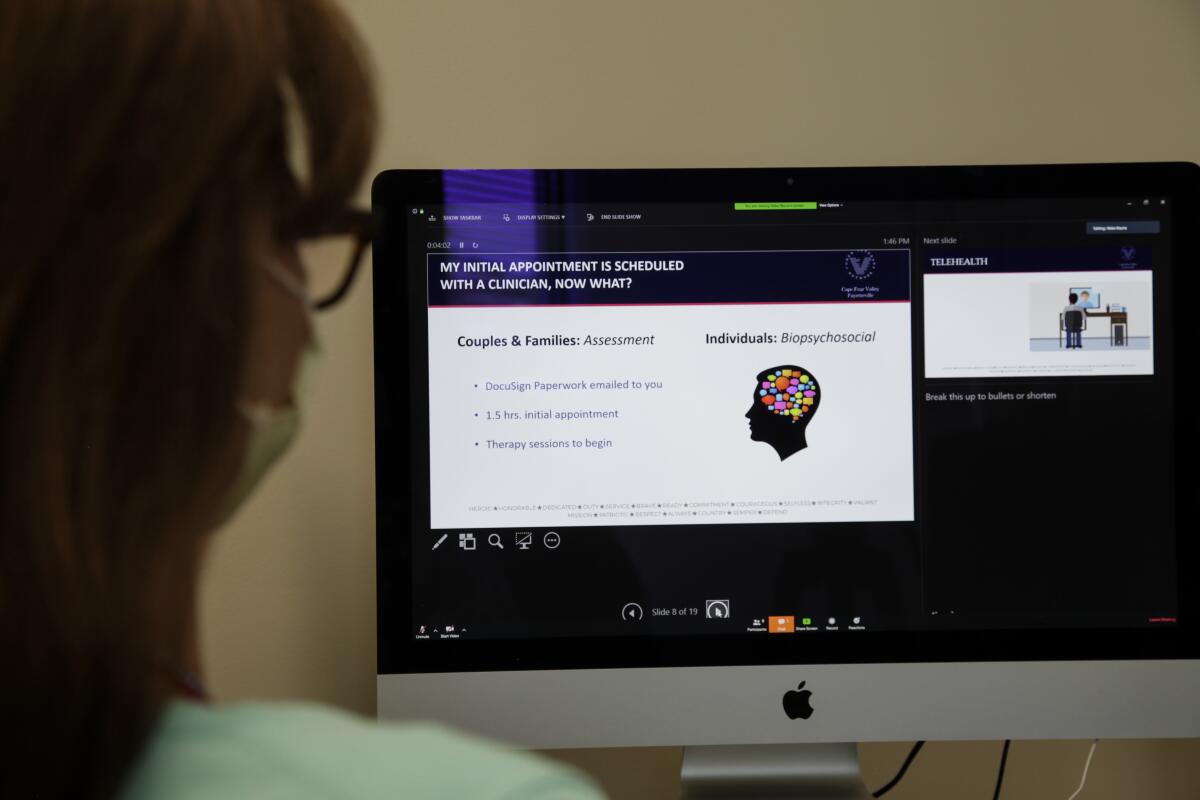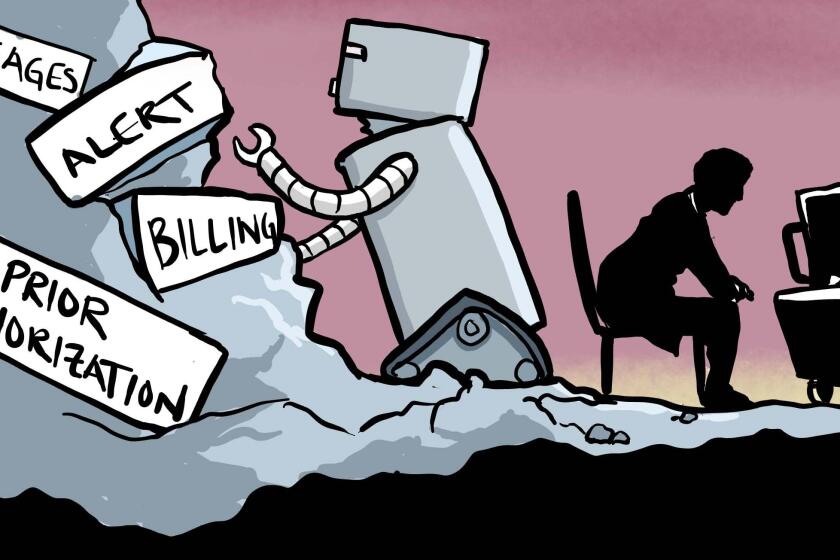Opinion: How California could extend mental health care to millions of residents in need

Healthcare provider Kaiser Permanente reached a $200-million settlement in October with the state of California over long waits experienced by patients needing behavioral health services. Greg Adams, Kaiser’s chair and chief executive, cited a shortage of qualified care providers as a major reason for delays in treatment. Such shortages are prevalent statewide: In one survey, only 27% of Californians said their community has enough mental health professionals to serve the needs of local residents. Among adults in the state with any psychiatric illness, 63% said they received no mental health services in the past year.
Earlier this year, I found myself among the millions of Californians with mental health needs. After my son’s birth, I suffered intense postpartum depression. I would cry every morning before driving to work. Gloom and hopelessness permeated my thoughts. Obsessive ruminations kept me awake at night.
California voters will be asked to decide on a ballot measure in March 2024 that includes a $6.38-billion bond to pay for mental health housing and services.
After struggling for months, I decided to find a therapist. This proved more challenging than expected. Given my work schedule, I needed someone who was available on weekends or evenings. As a Chinese American woman, I felt more comfortable being vulnerable with a therapist of the same cultural background and gender. After searching online, I identified a few providers in Texas who fit my criteria and offered teletherapy. However, I was dismayed to learn they wouldn’t be able to see me because they were licensed in Texas but not in California.
Master’s-level therapists must hold a license issued by the California Board of Behavioral Sciences in order to treat clients physically located in our state. Under current regulations, having a license from another state doesn’t cut it.
California could ease its shortage of mental health care providers by automatically recognizing therapy licenses issued by other states.
Cross-state licensure restrictions stifle telehealth’s potential to improve mental health care access. Teletherapy eliminates mobility and transportation barriers. Without geographical limitations, people could gain access to a larger pool of therapists who share an aspect of their identity, such as ethnicity, faith or sexual orientation. People can more easily find time for appointments if they can connect to video visits with a provider in another time zone. Telehealth could also make treatment more financially feasible: Someone who can’t afford therapy in L.A., where the average cost per session is $185, might be able to virtually see a therapist in Rochester, N.Y., where the average cost per session is $110.
As a gay Latino, I encountered limited and lacking treatment options.
The rationale for requiring an in-state license is to protect Californians from underqualified therapists. However, even though the amount of practice experience needed for licensure varies by state, all states do mandate some minimum standard of clinical time.
Furthermore, cross-state licensure restrictions have been removed in multiple instances. During the COVID-19 pandemic, some states, including California, issued temporary emergency declarations allowing therapists with out-of-state credentials to provide care. And in the Veterans Affairs system, mental health professionals licensed in any state can treat any veteran via telehealth, regardless of physical location. If therapists with out-of-state licenses are permitted to see veterans, why shouldn’t they be allowed to treat the rest of us?
State-specific licensure makes sense for some professions — for example, it is reasonable to require attorneys practicing in a particular state to demonstrate familiarity with its laws. But diagnostic criteria and treatments for mental conditions are standardized nationwide — depression is depression, whether you live in Alaska or Hawaii. It doesn’t make sense to restrict Californians from seeing therapists who are licensed in another state but not in our own.
Many physicians are burned out and rushed, so it’s no wonder if they fail to connect meaningfully with each patient. If a robot can help, why not?
Californians can take action to push for change. One way is by encouraging our lawmakers to pass legislation automatically recognizing therapy credentials issued by other states.
Another way to press for change is by petitioning the Board of Behavioral Sciences to modify current rules requiring an in-state license. Under California law, anyone can file an administrative petition requesting an amendment of regulations. The petitioner must submit a letter to the relevant state agency outlining the requested change and reasons for it; the agency then has 30 days to respond.
This process has yielded successes in the past. For instance, in 2017, advocacy groups petitioned against a regulation that made the children of migrant farmworkers switch schools twice annually. This led to legislation allowing these students to stay in the same school all year.
Thanks to telehealth, I eventually found a therapist who was a good fit. Although she lived in Arizona, she was able to see me because she had previously resided in L.A. and had maintained her California license. Because I got treatment, I’m now doing better and finding joy in living. My hope is that other Californians would also be able to see a therapist of their choice — even one with only an out-of-state license.
Mimi Zheng is a mother and physician in Los Angeles.
More to Read
A cure for the common opinion
Get thought-provoking perspectives with our weekly newsletter.
You may occasionally receive promotional content from the Los Angeles Times.













